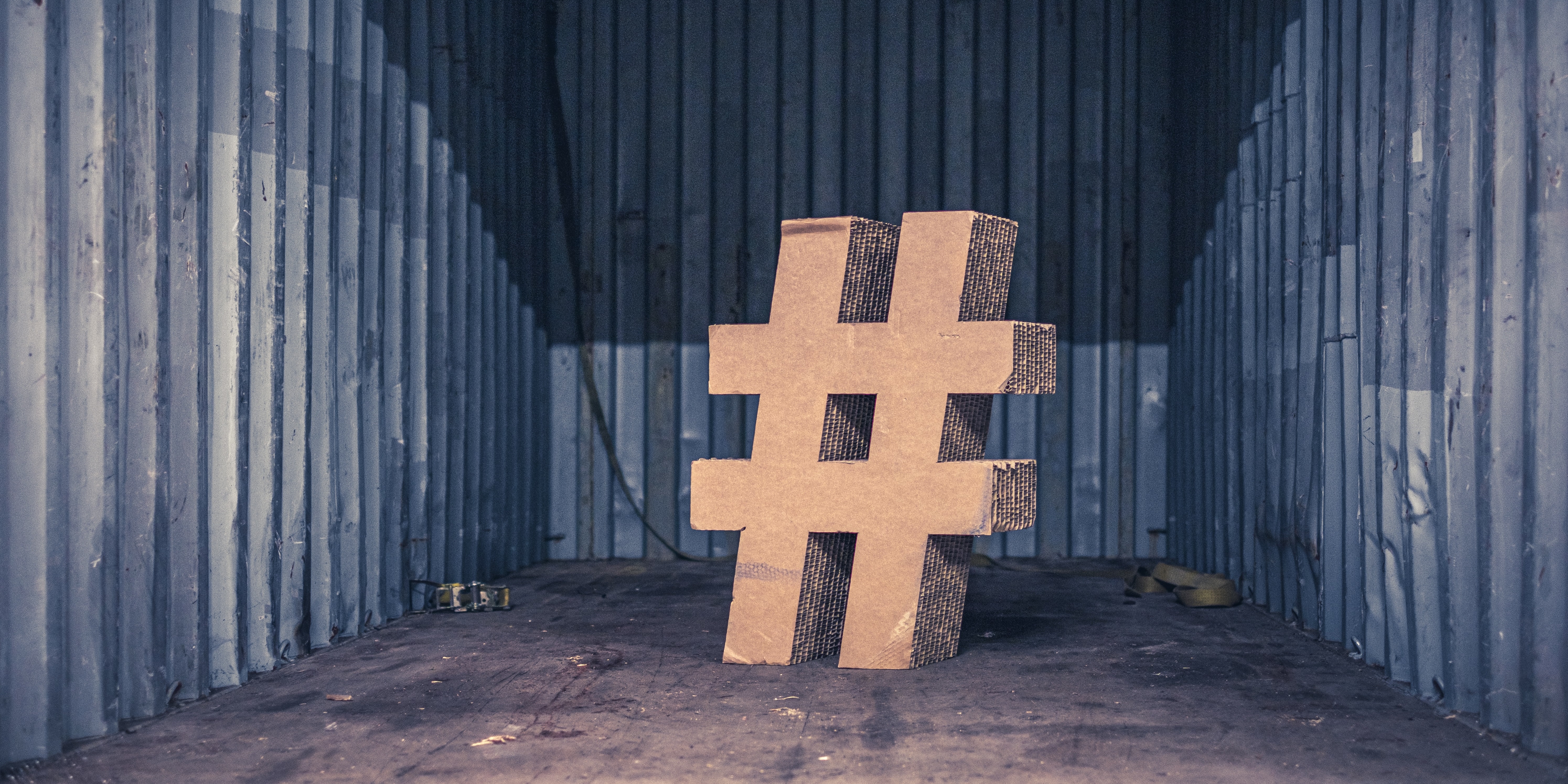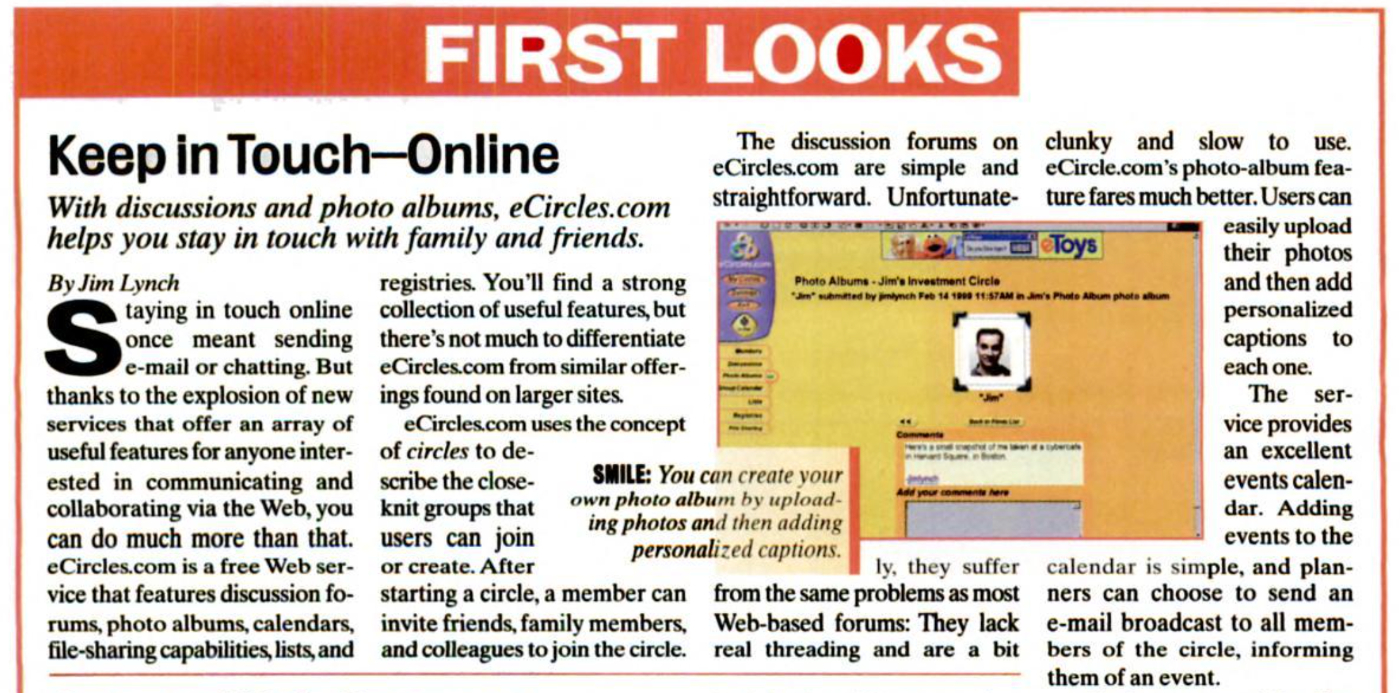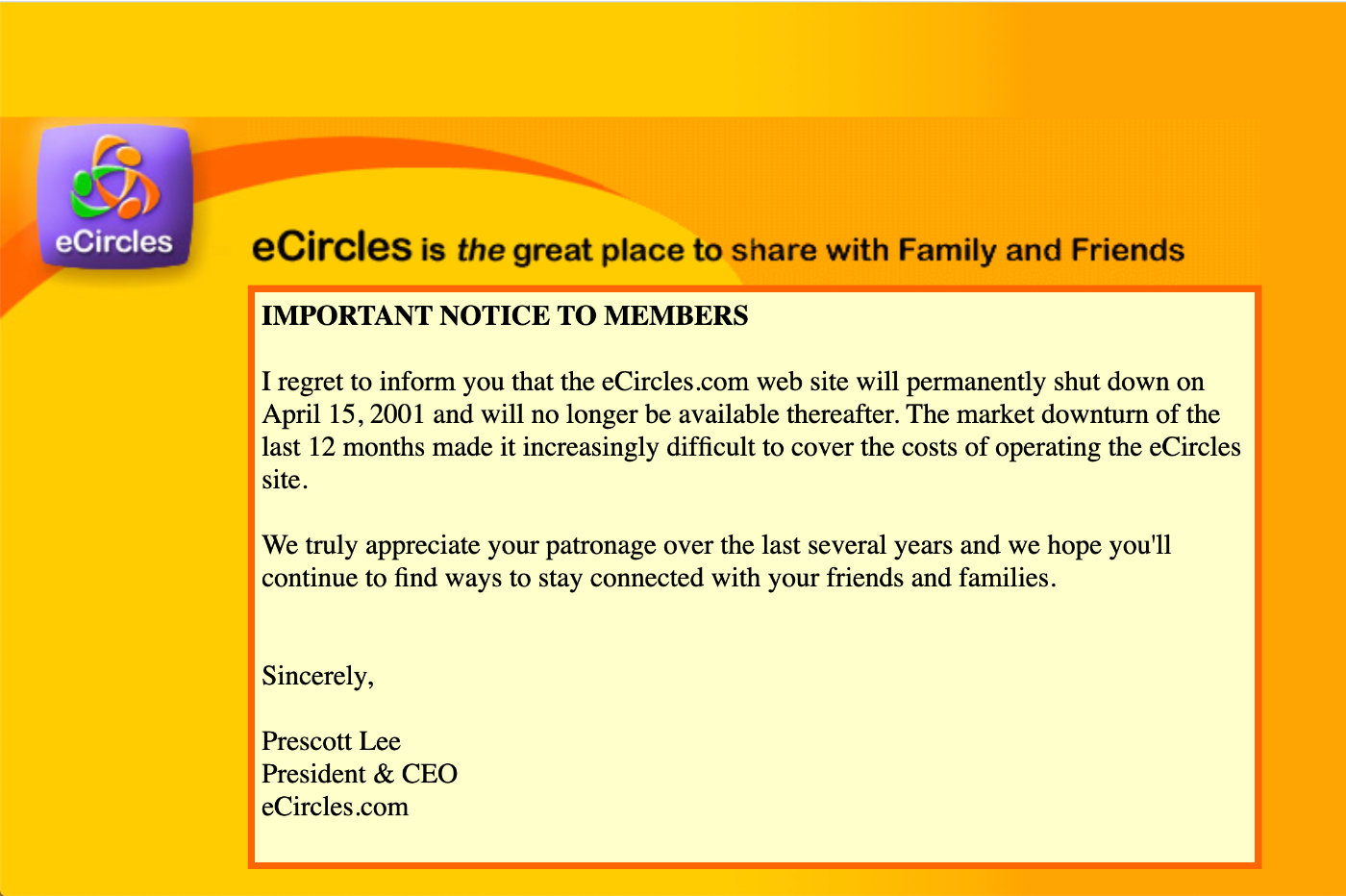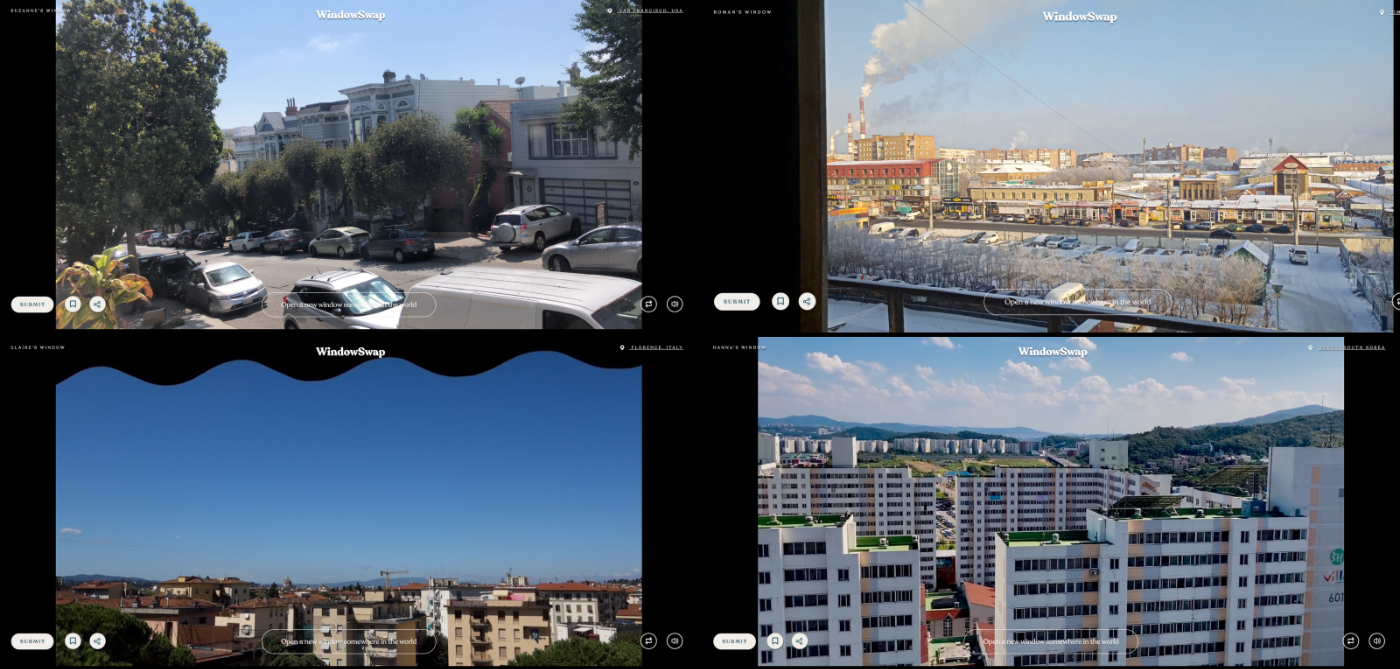
Welcome to another weekly edition of Cyberbits!
Cyberbits is a weekly curated newsletter of fascinating finds on the internet, from random Reddit threads to weird webpages. I’ll also occasionally include interesting bytes I come across while working on longer Cybernaut essays, like LinkedIn's Alternative Universe, Cashing in on Clubhouse and Caught in the Study Web. I send this out every Friday!
This week: the early days of eCircles, the best free resources on the internet, and the surprising story of one of TikTok’s biggest stars.
Internet Nostalgia: Before There Was Facebook There Was eCircles
eCircles was one of the earliest social networks. Co-founded by Prescott Lee and Nathanael Hayashi in 1998, the site had a catch-all tagline: “The simple, private way for friends and family to stay in touch, coordinate activities, and share information.”
If you squint, eCircles was essentially Facebook.
The internet is in a state of constant reinvention and what’s old eventually becomes new again. The latest version is often better and bolder than its predecessor. But each recent rendition is an echo of what came before.
The “First Looks” section of the April 1999 edition of PC Mag provides a review of eCircles and its familiar features: “discussion forums, photo albums, calendars, file-sharing capabilities, lists, and registries.”
“eCircles.com uses the concept of circles to describe the close-knit groups that users can join or create. After starting a circle, a member can invite friends, family members, and colleagues to join the circle.”
The early social network also had lists to keep track of books and CDs, gift registries to share present options with your circle, and file sharing (“eliminating the need to deal with email-attachment headaches.”) The site was free to use, but hoped to monetize by taking a cut of eCommerce purchases that members made through recommendations on the platform.
eCircles raised $28 million, hired 90+ employees and garnered 2.5 million users. But the social network didn’t survive the dot-com bubble; it was acquired by Classmates.com and permanently shut down on April 15, 2001.
eCircles is just one of many social networks that have come and gone. PlanetAll, Six Degrees, Friendster, MySpace and Nexopia have also shut down entirely or exist in a liminal state; barely alive but not quite dead. For now, apps like Facebook, Instagram, and Snapchat fill the void these platforms left behind.But there’s a cost that comes with porting our online lives across cyberspace again and again.
When a social network dies, our social activity on the site ceases to exist too; the photos, the DMs, and if the connections are loose enough, the relationships themselves. There’s always a new platform where we can set up shop, but the old context disappears and we have to start anew with only faint memories of the conversations that were. What could have served as time capsules into the past disappear without a trace in acquisition deals, lapsed domains, and site redirects.
Social networks that lure us in with the promise of being “a place for friends” or “the new way to meet people” eventually flame out, proving unreliable as a means to preserve our digital existence. Old usernames and online notes-to-self that might have provided a window into our past selves and former ties are simply erased. For a single user this might be insignificant. But compounded across millions of users, across half-a dozen or more social platforms where we’ve spent months or years, the scope of what’s lost is hard to grasp.
Will Instagram — with your feed of photos, archived stories, and close friends circle — exist in 10 years? 20 years? History dictates that it won’t. Disruption means there’s something new on the horizon that we’ll embrace at the expense of what’s old. Our social media presence is temporary and waiting to be wiped, erasing the clues of who we once were in the process. In a time where people are longing for internet anonymity and experimenting with alts, the online impermanence that comes with social media’s boom and bust cycles might be a gift in disguise. But for anyone who wants to hold on to a portal to the past, social media companies have proven to be fickle stewards of the communities they once argued were so important.
Internet Rabbit Hole
What is something free from the internet, which everyone should take advantage of? — As common as it is to critique how the internet commodifies and capitalizes just about everything (guilty), much of the web remains free and accessible. A recent Reddit discussion on the internet’s best free resources shows exactly that. The usual suspects — Wikipedia, SciHub, and The Internet Archive (which I used to find out more about eCircles!) are well-represented — but here are some spots I discovered for the first time:
- Window Swap — See recorded videos out of people’s windows across the world. On my first trip through, I saw Hanna’s window view in Seoul, South Korea, Suzanne’s view facing a row of victorians in San Francisco, and Roman’s vantage point in Omsk, Russia.
- Radio Garden — Tune into the local radio stations of places around the world. You might land on foreign music playing in Novi Kneževac, Serbia or hear a familiar english language song (Felix Jaehn - No Therapy) on a Magdeburg radio station in Germany.
- SlidesGo — For something slightly less whimsical and much more practical, this site is full of free templates for PowerPoint and Google Slides. It will improve the aesthetics of your next presentation.
Check This Out
Our Digital Pasts Weren’t Supposed to Be Weaponized Like This — From CEOs to high school students, digging into someone’s social media past and upending their lives has become a sport; “There is little appreciation for context or personal evolution.”
Internal Tech Emails — On the feed of a Twitter account that shares internal tech industry emails that “surface in litigation, FOIA, or news reporting,” you can find everything from what an Apple executive team meeting agenda looked like while Steve Jobs was CEO to a 2007 back-and-forth with Mark Zuckerberg and his former CFO about Facebook’s acquisition strategy (including a mention of Instagram).
Screenshots Are the Gremlins of the Internet — An intriguing meditation on the fleeting but terrifying reality of screenshots and how their ability to capture our communication “has imbued our lives online with a latent sense of paranoia.”
Dive In
Fresh Content
Khaby Lame, the Everyman of the Internet — This week, Jason Horowitz and Taylor Lorenz penned a wonderful profile of Khaby Lame, one of TikTok’s most popular creators. His background is as surprising as it is inspiring. If you’ve spent any time on TikTok you’ve encountered the “life hacks that aren’t really life hacks” genre — supergluing a toothpaste compartment to your toothbrush, using what that looks like a Victorian era torture device to put on your shoes, and sticking a dozen straws in your vacuum hose to get nooks and crannies.
Khaby Lame has become mainstay on TikTok’s For You page by wordlessly showing how ludicrous these “life hacks” are. He effortlessly performs the default action and then throws his exasperated version of a Jim Halpert stare to the viewer. In the process, his TikToks have garnered over 891M likes and he has 66.5M followers on the platform, a little over a year after he lost his factory job in Italy. Because Lame doesn’t typically speak in his videos, I had no idea he was based in Italy and no knowledge of the details surfaced in the profile:
“One unexpected side effect of Mr. Lame’s TikTok ascent is that it has exposed the vulnerable underside of his lack of Italian citizenship. His Senegalese passport has made it tougher to obtain a visa to visit the United States, he said. He’s still dealing with Italian bureaucracy and paperwork to get his citizenship.”
Internet Article Archive
How the Internet Gets Inside Us (2011) — A classic from Adam Gopnik, that still feels prescient today, describes three different cults of worldview about the modern internet: Never-Betters, the Better-Nevers, and the Ever-Wasers.
“The Never-Betters believe that we’re on the brink of a new utopia, where information will be free and democratic, news will be made from the bottom up, love will reign, and cookies will bake themselves. The Better-Nevers think that we would have been better off if the whole thing had never happened, that the world that is coming to an end is superior to the one that is taking its place, and that, at a minimum, books and magazines create private space for minds in ways that twenty-second bursts of information don’t. The Ever-Wasers insist that at any moment in modernity something like this is going on, and that a new way of organizing data and connecting users is always thrilling to some and chilling to others—that something like this is going on is exactly what makes it a modern moment.”
Which social media platforms were you on before Facebook, Instagram, and Twitter? I would love to hear about your former online hangout spots!
Have a lovely weekend,
Fadeke
P.S. A paid subscription to this newsletter gets you access to the entire Every bundle of newsletters and podcasts, including Glassy, Means of Creation, The Long Conversation, Talk Therapy, Napkin Math, and many more! You’ll also get access to our Discord community — this past week we had a live event debating whether or not you should join a startup and discussed everything from Mare of Easttown to cakes with threatening auras.
Find Out What
Comes Next in Tech.
Start your free trial.
New ideas to help you build the future—in your inbox, every day. Trusted by over 75,000 readers.
SubscribeAlready have an account? Sign in
What's included?
-
Unlimited access to our daily essays by Dan Shipper, Evan Armstrong, and a roster of the best tech writers on the internet
-
Full access to an archive of hundreds of in-depth articles
-
-
Priority access and subscriber-only discounts to courses, events, and more
-
Ad-free experience
-
Access to our Discord community





Comments
Don't have an account? Sign up!
Hi5, MySpace, possibly a few others.